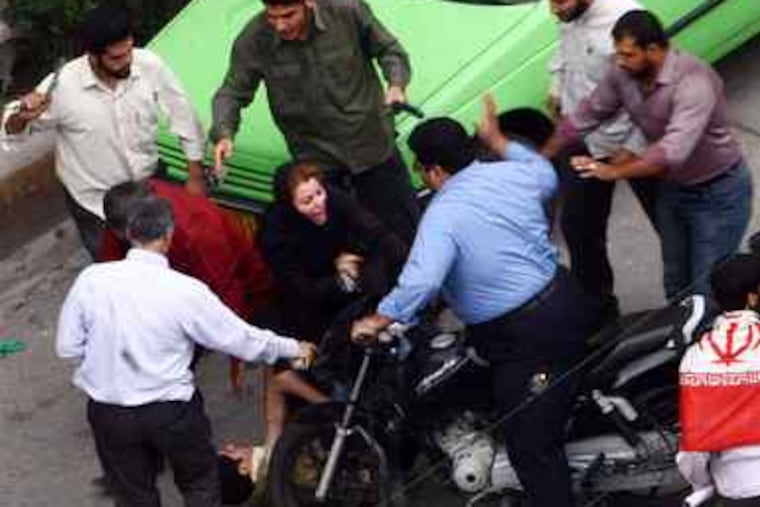Protests, appeals ratcheted up in Iran
Mousavi goes to clerics; Ahmadinejad unfazed.

TEHRAN, Iran - After dark last night, cries of "Death to the dictator!" and "Allahu Akbar!" ("God is great") echoed from rooftops across Tehran.
The protest against President Mahmoud Ahmadinejad and his disputed landslide election victory bore deep historic resonance. It was how the leader of the Islamic Revolution asked the country to unite against the Western-backed monarchy 30 years ago.
Ahmadinejad dismissed two days of sometimes violent demonstrations as little more than "passions after a soccer match" and drew his own huge rally of support yesterday even as protesters battled police in the streets.
The scenes summed up the showdown over the election: An outwardly confident Ahmadinejad exerted control while his rival, Mir Hossein Mousavi, showed no sign of backing down and could be staking out a role as powerful opposition voice.
Mousavi's allegations that fraud riddled Friday's vote brought sympathetic statements from Vice President Biden and other leaders. Mousavi appealed directly to Iran's ruling clerics to annul the result, but the chances were considered remote.
With his wide network of young and middle-class backers, Mousavi could emerge as a leader for Iran's liberal ranks and bring internal pressure on Ahmadinejad and Iran's theocracy to take less confrontational policies toward the West.
But the struggle yesterday was on the streets in the worst unrest in Tehran since student-led protests 10 years ago.
Demonstrators were back with the same tactics: torching bank facades and trash bins, smashing store windows, and hurling rocks at antiriot squads. Police responded with baton-wielding sweeps - sometimes targeting bystanders - and the regime shut down text-messaging systems and opposition Web sites.
There was no official word on casualties.
Authorities detained top Mousavi aides, including the head of his Web campaign, but many were released yesterday after being held overnight.
Iran's deputy police chief, Ahmad Reza Radan, told the official Islamic Republic News Agency that about 170 people had been arrested. It was not known how many remained in custody.
Mousavi has urged his supporters to channel their anger into peaceful acts of dissent. But the official clampdown on the Internet links blunted the reach of the message. At the same time, Mousavi went to the pinnacle of power to try to reverse the election result.
In a letter to the Guardian Council - a powerful 12-member clerical body closely allied to Ayatollah Ali Khamenei, Iran's supreme leader - he wrote that "fraud is evident."
The letter, posted on Mousavi's Web site, which is accessible outside Iran, did not specify his allegations, but he said his envoys had been unfairly blocked from monitoring polling stations. Iran does not allow outside or independent election observers. The Guardian Council must certify all election counts.
Mousavi later met Khamenei, who has almost limitless power, to press his appeal, said Shahab Tabatabaei, a prominent activist in Mousavi's camp.
It was likely a long-shot mission by Mousavi, 67, who was prime minister in the 1980s. Khamenei has already given his blessing to the election outcome, and it would be extraordinary for him to change his position.
In a news conference, Ahmadinejad called the level of violence "not important from my point of view" and likened it to the intensity after a soccer game.
"Some believed they would win, and then they got angry," he said. "It has no legal credibility. . . . The margin between my votes and the others is too much, and no one can question it."
"In Iran, the election was a real and free one," he told a room packed with Iranian and foreign reporters.
But Ahmadinejad also accused international media of launching a "psychological war" against the country.
Iranian authorities have asked some foreign journalists who were in Iran to cover the elections to prepare to leave. Nabil Khatib, executive news editor for Dubai-based news network al-Arabiya, said authorities had told the station's correspondent in Tehran that they would close the office for one week.
No reason was given, but the station was warned several times Saturday that it needed to be careful in reporting "chaos" accurately.
A sustained and growing backlash to Iran's power could complicate the country's policies at a pivotal time.
President Obama has offered to open dialogue after a nearly 30-year diplomatic freeze. Iran also is under growing international pressure to make concessions on its nuclear program.
In Paris, French Foreign Minister Bernard Kouchner said his country was "very worried" about the situation in Iran and criticized the "somewhat brutal reaction" to the election protests.
But the U.S.-backed governments in Afghanistan and Iraq, both neighbors of Iran, issued congratulations.
In Tehran, both sides mounted competing protests yesterday.
Less than a 10-minute walk from Ahmadinejad's news conference, protesters raged through streets and lit piles of tires as barricades to block police. About 300 Mousavi supporters gathered outside Sharif University, chanting, "Where are our votes?"
By midafternoon, tens of thousands of Ahmadinejad supporters had filled Vali Asr Street - where Mousavi had held a massive preelection rally last week. Ahmadinejad's forces waved Iranian flags and green Islamic banners, an obvious response to Mousavi's campaign, which adopted green as its color.